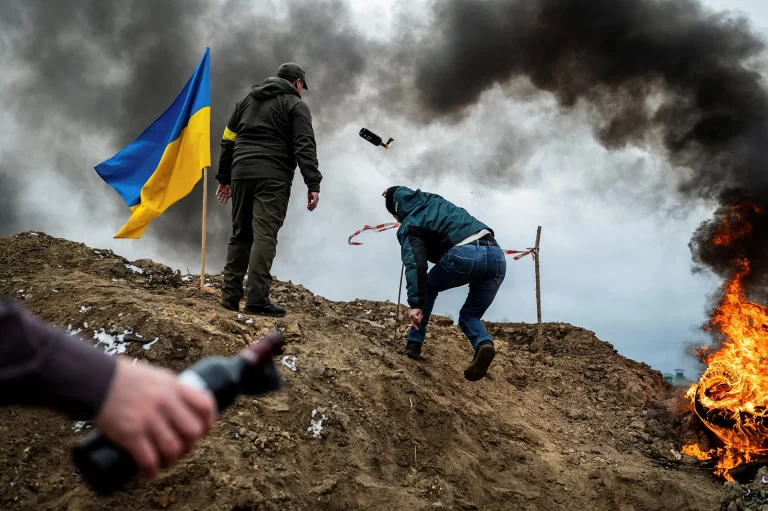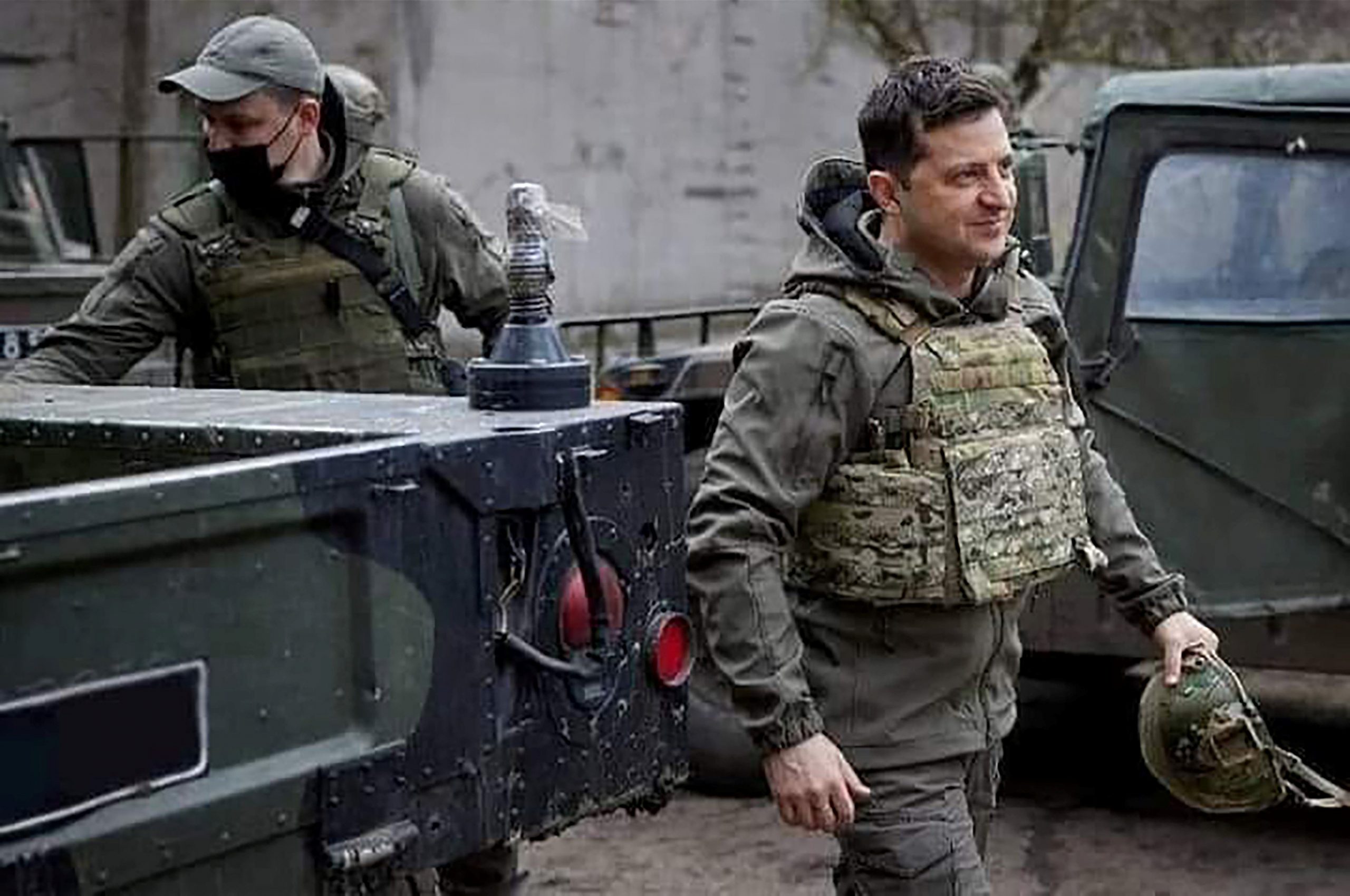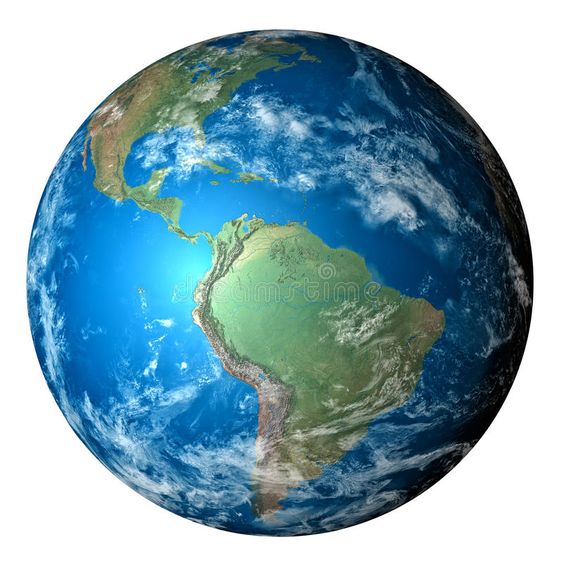
Russia’s one big advantage is weaponry. It has a massive arsenal of cruise missiles, hypersonic missiles, tanks, ships, planes … and, of course, chemical and nuclear weapons. But so far they have proved inept at utilizing these weapons against a poorly armed and numerically inferior force.
By Tom Arms
It is incredible what the Ukrainian army has achieved. If NATO answers the Ukrainian foreign minister’s call for “weapons, weapons and weapons” then Vladimir Putin is almost certain to suffer the most humiliating of humiliating defeats.
A few facts and figures: Ukraine’s defense budget is $5.4 billion. Russia’s is $61.7 billion. Russia has five times as many active military personnel as Ukraine; six times as many tanks and artillery, four times as many armored vehicles; 13 times as many aircraft and more than ten times as many ships.
The line-up in Ukraine resembles the Biblical David and Goliath tale and with the same result.
The reason is that wars are not always decided on the simple issue of numbers and types of guns. There are any number of other unquantifiable factors that are thrown into the messy mix and can determine the outcome of battle.
For a start there is the undeniable question of justice. Right v. wrong. Good v. Evil. There is no doubt that in the opinion of the overwhelming proportion of the world’s population that Ukraine stands on right side of the equation and Russia on the wrong.
That has been underscored by this week’s vote in New York to remove Russia from the UN Human Rights Commission by a shattering majority of 93 votes to 24 with 58 abstentions. To remove a permanent member of the Security Council from an important UN body is a major international political statement which must reinforce the resolve of every Ukrainian fighter preparing to repel the anticipated Russian offensive in the East.
The Ukrainian army also have home ground advantage. They have an intimate knowledge of every nook and cranny of their country. The population supports them (contrary to Kremlin reports) and they enjoy the moral imperative of defending their country, homes and families from what has been exposed as an army of ruthless killers.
There are other slightly more quantifiable factors. The Ukrainian military was a mess in 2014 when the Russians annexed Crimea and sent their “little green men” into the Donbass Region. It was corrupt, ill-equipped and poorly-trained. In the intervening eight years, the government has significantly curbed corruption. Training, weapons and money have been provided primarily by Washington and London and the fighting in Eastern Ukraine has forged a battle-hardened predominantly professional army.
The Russian army has five times as many soldiers, but it is riddled with corruption and is based on a conscript force which serves for only a year. The Russians have two drafts a year: One in the spring between 1 April and 15 July and another in the autumn/winter which stretches from 1 October to the 31st of December. Roughly 1.2 million men between the ages of 18 and 27 register for the draft and about 250,000 are called up for active service every year. This year the spring call-up was moved forward a month because of the Ukraine war.

Russian conscripts receive one to two months basic training and are not supposed to be sent into combat until they have had four months total training, although there are reports of conscripts being rushed into the Ukrainian frontline because of high casualties. On paper, Russia has an additional two million-strong reserve force, but only about 10,000 are active reserves who receive regular monthly training.
Putin also has access to a small but effective group of mercenaries called the Wagner Group. According to Western intelligence, about 1,000 of these mercenaries are currently operating in Ukraine. They are funded by the GRU, Russian military intelligence. Mercenaries are also being recruited from Syria and Libya, but their usefulness has been discounted by Western military experts.
The Kremlin can mobilize quickly by declaring martial law. On 22 February the Russian Duma passed a law making it mandatory for every man of military age to report to their local military commissar without receiving a conscription notice if the Kremlin announces martial law. Dodging the draft is a felony with a two-year jail sentence attached.
Russia’s one big advantage is weaponry. It has a massive arsenal of cruise missiles, hypersonic missiles, tanks, ships, planes … and, of course, chemical and nuclear weapons. But so far they have proved inept at utilizing these weapons against a poorly armed and numerically inferior force.
NATO has the weapons to challenge the Russians on-paper superior arsenal. Ukraine has proven itself willing and able to use them.
- Here’s a good one: In the wake of the Bucha massacres, a Russia Today commentator opined this week that the dead Ukrainians littering the street were killed by British intelligence because Bucha sounds like butcher in English. This made it easier, he continued, for British newspapers to write headlines such as the “Butchers of Bucha.” How SIS and/or British troops managed to sneak undetected into Bucha, blow up homes, tanks and roads and kill the inhabitants is left unexplained. But that is of no consequence. The problem is that too many Russians believe him. In fact, what passes for a reasonably independent opinion poll in Russia this week showed that 80 percent of the population accept the Kremlin version of events. A big part of this support is because the Russian people are denied access to news reports produced from outside Russia. But this is only part of the story. Putin knows that domestic support is essential for success in Ukraine and he has been laying down the foundational lies since 2007—perhaps even before. These included: Ukraine is governed by Nazis. NATO is threatening to overrun Russia. Russian culture is under threat from the West. Russia is being denied its rightful place as a great power. With this firm propaganda bedrock in place—and total state control of the media—it becomes easier for the Russian public to swallow the inevitable mountain of lies that follow.
- It is unsurprising that Russian soldiers are being accused of violent war crimes. Violence begets violence and Russia, according to their own statistics, is a violent society. Russian police have reported that one in four Russian households have suffered domestic violence at some point. The figures are considered a major embarrassment, so much so that the Duma recently voted to massage the statistics by decriminalizing several categories of domestic violence in an attempt to improve the national image. The roots of the problem are directly linked to chronic national alcoholism. Twenty-five percent of Russian men die before the age of 55 alcohol-related diseases. On average, each Russian downs 1,500 shots of vodka a year. Various governments over the years have tried to curb Russians’ love affair with the bottle. The latest attempt was in 2010 when President Dmitri Medvedev introduced a minimum charge of $3 a bottle of vodka and banned drinking and driving. The legislation, however, appears to have little effect on drinking habits and recently the Kremlin gave into public pressure and amended the drink driving law to allow “one for the road.”
- Look out Moldova. The Russians are coming. Actually, they are already there as the Kremlin has based 1,500 “peacekeepers” in the breakaway mainly Russian-speaking region of Transnistra. The “Republic of Transnistra” (which is recognized only by three other Russian-supported breakaway entities) split from the rest of Moldova after a 1992 civil war. When the Kremlin annexed Crimea in 2014, the head of the Transnistran parliament asked to join Russia. At the time Putin put the proposal on ice. But the course of the Ukraine war has changed matters. Blocked in the north, Putin has shifted operations to the south and east where he has a springboard in Crimea and the Donbass. One obvious target is the strategic port of Odessa, the loss of which would leave Ukraine landlocked. Russian ships are already shelling the Ukrainian port. Only 137 miles away is the Moldovan border and if Russia is to maintain control of Odessa it must bridge that gap and beyond. In Moldova are the Russian peacekeepers, the breakaway province nestled between the Ukrainian border and the Dnieper River, and roughly 350,000 Ukrainian refugees. Intelligence sources believe that Putin is planning a false flag operation to claim Russian speakers in Transnistra (150,000 of whom have Russian passports) are under threat and need his protection.
- A major chink appeared this week in the Western Alliance’s united front against the Russian invasion of Ukraine—the re-election of Hungary’s Viktor Orban. He is Eastern Europe’s right-wing, Euro-skeptic, self-styled “illiberal democrat”, anti-immigrant who is also an ardent admirer of Vladimir Putin. The Russian president, in fact, was among the first to congratulate Orban on winning his fourth successive term. This is unsurprising as Orban is point blank refusing to consider a ban on Russian oil and gas imports; will not send weapons to Ukraine or allow them to be transited through Hungary and has said he would break ranks with other EU countries to pay rubles for Russian energy. He has, however, agreed to EU sanctions against Russia and condemned the invasion of Ukraine, but pointedly refused to criticize Putin personally. Doubts have been cast over the legality of Orban’s election victory as the opposition was largely denied access to the state-controlled media. Two days after the election result, the EU (which has been at loggerheads with Orban for years) announced it was beginning proceedings to block $38 billion worth of EU funds on the grounds that the Hungarian government was failing to meet EU democratic standards and that Orban was channeling EU funds to political supporters. Orban is also under attack from his former allies in the Visegard countries. Poland, the Czech Republic and Slovakia are angry that Hungary refuses to fully back Ukraine.
- Can France’s right-wing presidential candidate Marine Le Pen maintain her momentum and win the second round of the French elections on 24 April? She and incumbent Emmanuel Macron are almost certain to emerge as the head-to-head second round candidates after the first round of votes are cast this weekend. For the past six months Macron has been the clear favorite but in the past few weeks he has lost five to six percentage points against Le Pen and one poll this week put the leader of the National Rally Party one point ahead. This will be Le Pen’s third attempt to gain residency of the Elysee Palace. In 2012 she came third and in 2017 she lost in the second round run-off to Macron with a disappointing 34 percent of the vote. On those occasions she was seen as the standard bearer of the unacceptable far-right. This election has been different. For a start she had unintentional help from the even more extreme right-winger Eric Zemmour, whose candidacy attracted the barbs of centrists who would otherwise be focusing on Ms. Le Pen. This allowed the National Rally leader to focus on energy prices and the cost of living crisis and enabled her to largely ignore her links with Vladimir Putin, Russian money, euro-skepticism and her anti-immigrant position. Her lengthy stay at the top of French politics has also helped. Marine Le Pen has been the leader of the French right since 2011 and in politics, longevity can breed acceptability. Observers have noted that in this election, Ms. Le Pen has managed to project a softer personal image that has gone a long way towards her becoming an “acceptable” right-wing politician. But two weeks is a long time in politics. Most polls still put Macron six points ahead in the second round. In the first round Ms. Le Pen shares the electoral stage with 11 other candidates. It is doubtful whether she will survive when the glare of the spotlight is focused almost entirely on her more questionable connections and policies.
___________________
 Tom Arms is foreign editor of Liberal Democrat Voice, the author of “The Encyclopedia of the Cold War” and the recently-published “America Made in Britain.”
Tom Arms is foreign editor of Liberal Democrat Voice, the author of “The Encyclopedia of the Cold War” and the recently-published “America Made in Britain.”
